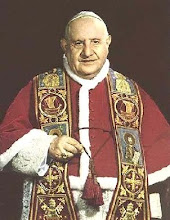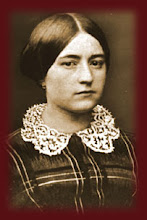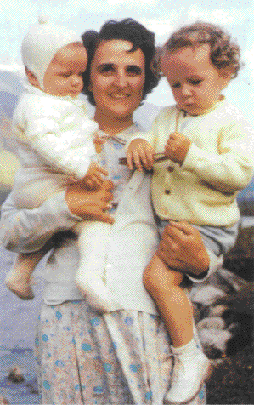
When I taught both studio and class voice in my university system, I tried very hard to discern what sort of a person each of my students was, and to choose the right repertoire for each based not only on vocal characteristics but also on everything the student presented to me: his ethos, if you will. Most of my private-lesson students were older than I was, returning students who had been sidetracked by life from finishing their bachelor's degrees at a more usual age. The music department offered two bachelor's degrees in music, the B.A. and the more prestigious B.M.; all of my private-lesson students were B.A. students, with the exception of one frighteningly gifted M.M. candidate. A few of them hoped to transfer from the B.A. in Music degree to the B.M. in Music Performance degree, a switch that was based entirely on an audition before a faculty committee.
I loved my students, and I spent a lot of time worrying about them. They were from wildly divergent backgrounds. One was the daughter of a famous Puerto Rican bandleader who had discouraged her from a career in music, her true love; she made a living selling gloves and hats from a table outside the Metropolitan Museum of Art. One was a Haitian Seventh-Day Adventist, a highly intelligent woman who spoke German as well as French and whose singing revealed hints of a magnificent natural instrument -- if only we could have freed her physically and psychically to the point that she could have accessed it. Another was T., a shy, socially-awkward man in early middle age who worked as a paralegal, and who confided after three lessons that he was a recovering alcoholic (this didn't suprise me; I had had some experience with the language of the Twelve Steps, which I noticed that he used with some frequency). All of my students were profoundly wounded and heartbroken people. They didn't have to tell me so; the dynamic of the private voice lesson is so transparently revealing, and the rough areas in the voice provide such an accurate mirror of the catches in the soul, that I didn't need to look hard to grasp their woundedness, if not always the nature of their wounds. This is why it is so essential that a voice teacher be compassionate. The voice -- that intangible, ethereal instrument played by the passage of air over two threads of gristle in the throat -- can be not only a diagnostic gauge of the inner singer, but also, ideally, a means of healing for both the singer and her audience.
T. surprised me in our first lesson by bringing in a song he was working on on his own. Occasionally students did this, the song generally being from the Broadway repertoire. T.'s choice, however, was Schumann's "Schöne Wiege meiner Leiden," number 5 of the Op. 24
Liederkreis, settings of poems from the
Buch der Lieder of Heinrich Heine, the greatest poet of German Romanticism (and also a notable Jewish convert to Christianity, who famously declared on his deathbed in Paris: "I know that God will forgive me my sins:
c'est son métier"). This was an ambitious choice. I usually started my students on one or more of the shopworn
Twenty-Four Italian Songs and Arias from the Seventeenth and Eighteenth Centuries (known unkindly in the trade as "Twenty-Four Dago Ditties"). But T.'s German was excellent, and he even directed me in how he wanted me to accompany him in the piano part; he had rather well-formed ideas and opinions about how the piece should sound, one of the hallmarks of a true musician.
"Schöne Wiege" starts off as a gently-rocking strophic
berceuse, then turns quickly into a rhapsodic, though brief, through-composed
scena, with the off-kilter rhythmic phrases and the melodic angularity typical of Schumann. Its subject, and the subject of the song cycle in which it is the pivot, is that great theme of German Romanticism: unhappy love that forces the wounded lover on a journey which, in some treatments, ends in death (as in Schubert's
Die Schöne Müllerin and Mahler's
Lieder eines fahrenden Gesellen) or madness (as in Schubert's
Winterreise). My translation follows:
Beautiful cradle of all my sorrows, beautiful tomb of my repose,
Beautiful city, we must part: "Farewell," I call to you.
Farewell, you holy threshhold where my beloved wanders;
Farewell, sacred spot where I first saw her.
And had I never seen you, beautiful queen of my heart,
The wretchedness I now endure would never have befallen me.
I did not wish to touch your heart; I did not seek your love --
I wished only to live a quiet life near the place where your breath flutters.
But you yourself drive me from here; your mouth speaks bitter words.
Madness takes hold of my mind, and my heart is sick and sore.
And I drag my weary, weakened limbs away, leaning on my wanderer's staff,
Until the time I might lay by tired head in some cool, far-off grave.
I was astonished by T.'s innate feeling for this difficult piece, and we quickly came to the point where I felt like I was serving him badly by accompanying him. I hired a student accompanist, an excellent pianist from Sweden, to come to our lessons, paying her myself. Out from behind the piano, I could work with T. more intensely on his breath and his phrasing. This ushered in one of the most thrilling times I've had as a teacher. Working on "Schöne Wiege" in the studio with T. and the accompanist, I felt as if we were riding a cresting wave together as three musicians. T. achieved moments in which there wss a synergy between his line and the equally important piano part, and when not only the melody and the meaning of the text, but even the sounds of the words themselves created multiple layers of meaning in his performance. Especially stunning was the way that he was able to sing each repetition of "Lebewohl!" (farewell!) differently, drawing one out with rubato, clipping another. I would leave these lessons feeling elated, as if I had finally found out what God wanted me to do, and was privileged to know the joy of doing it.
T. wanted to audition for the B.M. degree, so we started working on an audition program. I gave him a piece by Fauré, an Italian piece, the identity of which, oddly, I can't recall (oddly, because for most of my performing career I specialized in Italian music), the aching tenor showpiece "Lonely House" from Kurt Weill's
Street Scene, and "Der Lindenbaum," the best-known piece from Schubert's great
Winterreise. "Der Lindenbaum" (The Linden Tree) also treats the theme of being made to leave home forever, driven on by the unforgettable pain of love gone wrong, and it has become a kind of folk-song in the German-speaking lands. In one stanza, the narrator describes how, in the course of his journey, the cold wind has blown his hat away, and yet he does not stop. T. mentioned something that I hadn't considered: that in Europe in the 1820s, a man outdoors without his hat would have been unimaginable; the fact that the narrator doesn't turn back for his hat, T. suggested, showed the desperation of his plight, and was a clear foreshadowing of the madness into which he almost willfully descends at the end of the cycle. This was the kind of student I had dreamed of teaching, one who gave serious thought to the meaning of the text and the music, and to the reasons composers might have had for writing as they did.
When the time for T.'s audition came around in the spring, he clutched. I had instructed him to start the audition, at which I was not allowed to be present, with one of his best pieces - the Weill or the Schubert - but he second-guessed the audition committee and decided that they would probably want to hear the Italian piece that I can't recall first. A mistake. He wasn't admitted, and the following year switched his major from voice to music composition.
Near the end of the school year, I organized a recital for my students. T. was to sing "Lonely House" and "Lindenbaum." He rushed in just as the recital was starting, an etiolated, sickly-looking man who I realized was his boyfriend in tow. He told me at the intermission that he almost hadn't come. His beloved cat was near death, and he was beside himself. He got through his pieces, though he didn't shine.
This made me think about all the dreadful times in my life when I had kept on singing. There was simply nothing else to do; many times singing had seemed the only thing left to me. In our next lesson, one of our last, I mentioned obliquely some of these occasions in my own life, which included my abortion. An artist, I explained, has to be cool-headed even in the face of great personal suffering.
C'est son métier. It's his job to sublimate his own suffering into a balm that might touch those who hear him, and give them the healing that he seeks for himself.
I never saw T. again after that. He still has a CD I lent him, the wonderful
"Tryout," which features recordings of Kurt Weill singing and playing his own songs in rehearsal for his Broadway shows.
To hear fine performances of T.'s repertoire, go
here for the Schumann,
here for the Schubert, and
here for the Weill.
















